https://www.fnn.jp/articles/-/769481?display=full&s=03
[Exclusive] Jehovah's Witnesses criticize "Q&A" banning religious abuse: 700+ pages of document "restraint" on the country?
Second generation religious issues
Blood transfusions were prohibited, corporal punishment was carried out with whipping, and former members were shunned.
The new Christian religion "Jehovah's Witnesses" has been criticized both at home and abroad for violating human rights, with lawyers revealing such acts against second-generation religious members as the results of their investigations. In March 2024, it was discovered that the sect submitted a document to the Agency for Children and Families criticizing the guidelines prohibiting religious abuse.
 Documents submitted by Jehovah's Witnesses to the Agency for Children and Families obtained by FNN
Documents submitted by Jehovah's Witnesses to the Agency for Children and Families obtained by FNNFNN requested the Child and Family Agency for Public Information and obtained a total of 776 pages of documents prepared by the cult. Experts point out that the cult's actions "may have been aimed at restraining the country."
The emerging issue of second-generation religious
The issue of second-generation religious believers has attracted attention since the shooting of former Prime Minister Shinzo Abe in July 2022.
Through interviews with second-generation religious believers, the government published a Q&A on how to respond to child abuse related to religious beliefs at the end of the same year. It established guidelines to prohibit abuse in the four types stipulated in the Child Abuse Prevention Law: 1) physical abuse, 2) sexual abuse, 3) neglect, and 4) psychological abuse.
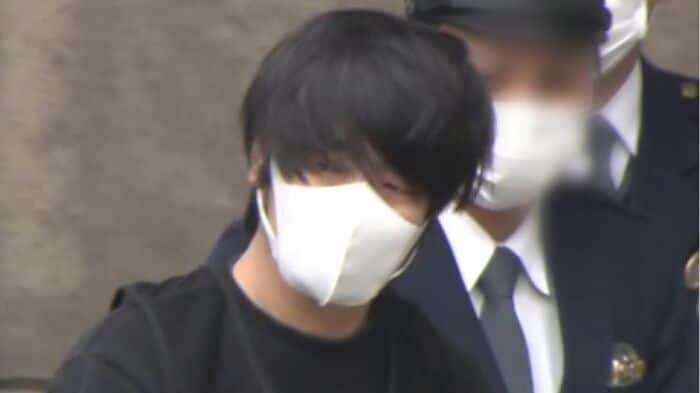 Tetsuya Yamagami, the defendant who shot former Prime Minister Abe, was a second-generation religious believer
Tetsuya Yamagami, the defendant who shot former Prime Minister Abe, was a second-generation religious believerFurthermore, based on the Q&A, the Agency for Children and Families conducted a survey of child consultation centers nationwide without identifying religious corporations. The results, published in April this year, revealed multiple confirmed cases of "refusing to allow blood transfusions that doctors deemed necessary," "inciting fear through words and images to hinder the child's free decision-making," and "significantly neglecting upbringing by participating in missionary activities."
A 776-page "Submission to the Japanese Government" suddenly arrived
Meanwhile, it was discovered that in March 2024, around the time of the survey, the cult had sent a document to the Agency for Children and Families and other organizations criticizing the Q&A.
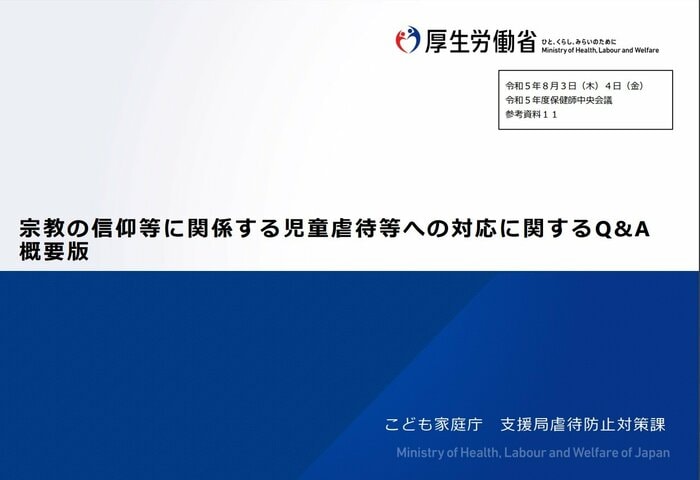 Jehovah's Witnesses sent out literature criticizing "Q&A"
Jehovah's Witnesses sent out literature criticizing "Q&A"FNN made a disclosure request to the Agency for Children and Families in June 2024. The documents were made public in September.
The document, titled "Jehovah's Witnesses: People Who Love and Care Deeply for Their Families: A Submission to the Japanese Government," is 776 pages long and about seven centimeters thick.
 Most of the documents released were redacted
Most of the documents released were redactedHowever, the contents of the documents that were made public were deemed to be "likely to harm the rights, competitive position, or other legitimate interests of the corporation or other entities" under the Freedom of Information Act, and with the exception of a few pages, almost every page was "blacked out."
Meanwhile, subsequent interviews with those involved revealed how the document was submitted and its gist.
According to a person involved, in March 2024, a person in charge of the cult contacted the Child and Family Agency's Child Abuse Prevention Division, saying that they wanted to meet. When the member of the division replied that they would refrain from meeting, the person in charge later brought the documents without an appointment and sent them by mail.
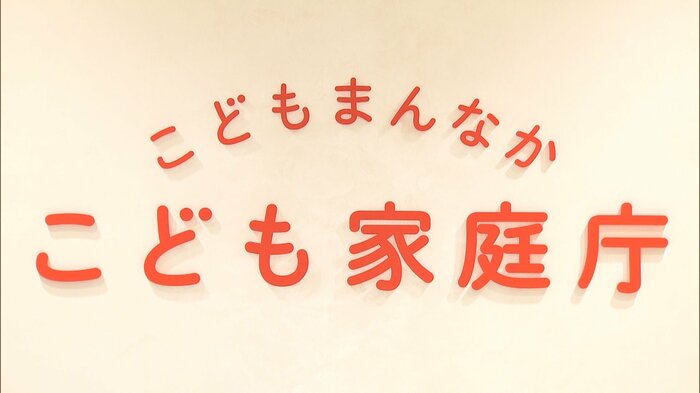 The church officials visited
The church officials visitedThe document denied the existence of religious abuse within the cult, but mentioned the freedom of religion guaranteed by the Constitution, and also criticized the Q&A. It cited flaws in the process of creating the Q&A, including "the composition of the review committee was biased" and "it only took about three weeks to create." It also included written opinions from scholars.
The letter also claimed that "the publication of the Q&A led to a more than seven-fold increase in hate crimes against those associated with the cult," and that "the Q&A serves as a justification for hate crimes," and that the Q&A should be reviewed by experts independent of the government.
Is this a warning to countries requesting a dissolution order?
Professor Nishida Kimiaki (social psychology) of Rissho University, who was involved in compiling the Q&A and is an expert on issues such as second-generation religious leaders, points out that "the background to this is probably concern about the request for a dissolution order to the former Unification Church (Family Federation for World Peace and Unification)."
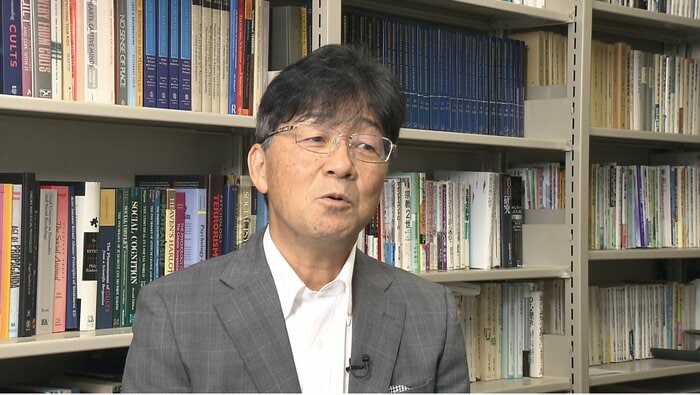 Professor Kimiaki Nishida (social psychology) of Rissho University, an expert on issues such as second-generation religious leaders
Professor Kimiaki Nishida (social psychology) of Rissho University, an expert on issues such as second-generation religious leadersRegarding the former Unification Church, the government requested an order to disband the sect at the Tokyo District Court in October last year, and the hearing is still ongoing. "It seems likely that they were concerned that the series of moves such as the formulation of Q&As and fact-finding investigations had made the abuse within Jehovah's Witnesses visible, which could lead to the request for a disbandment order spreading to them as well. They probably wanted to warn the government by saying they would 'fight' against such moves."
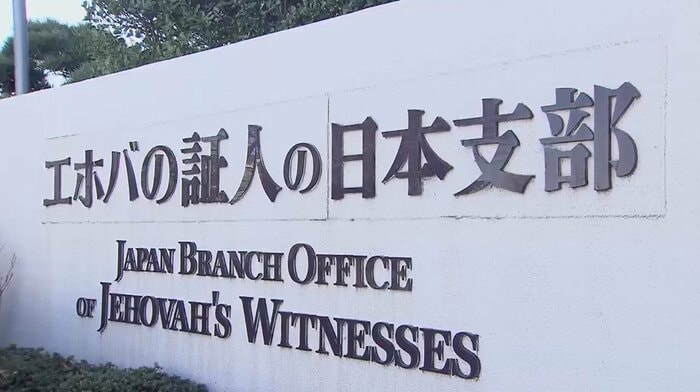 The lawyer pointed out that "on the surface they appear to comply, but behind closed doors they criticize the authorities."
The lawyer pointed out that "on the surface they appear to comply, but behind closed doors they criticize the authorities."Attorney Hirotaro Tanaka of the Jehovah's Witnesses Problem Support Lawyers Group mentioned a press release issued by the sect in May 2023. In the press release, the group stated that it would be happy to cooperate with the Agency for Children and Families, including by informing all believers of the Q&A. Attorney Tanaka pointed out that "it is obvious that the sect is showing its willingness to comply on the surface while secretly criticizing the authorities."
Apart from Jehovah's Witnesses...
We asked the Japan branch of Jehovah's Witnesses about this document, but received no response, saying, "We decide which media organizations provide information to us. Therefore, we will refrain from responding to your interview request at this time."
FNN also filed a freedom of information request to find out whether other religious corporations had submitted documents to the Agency for Children and Families similarly criticizing the Q&A, but was unable to find any such examples apart from those of Jehovah's Witnesses.
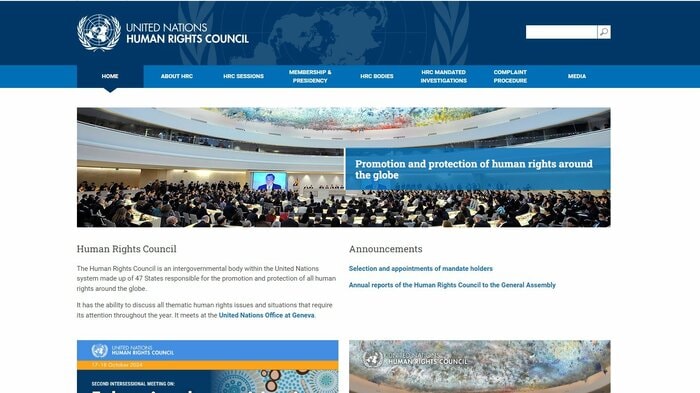 UN Human Rights Council Special Rapporteur expresses concern over "Q&A"
UN Human Rights Council Special Rapporteur expresses concern over "Q&A"In April 2024, a special rapporteur from the United Nations Human Rights Council sent a notice to the Japanese government expressing concern over Q&A, stating that "Q&A has led to hate crimes." However, the Japanese government responded in June, "Even if Q&A has been used to justify hate crimes, it is extremely regrettable regardless of the policy intention."
The human rights of children, which must be protected, and the freedom of religion guaranteed by the Constitution. The gap between the two is not likely to be easily bridged. However, the second generation of religious believers are still stuck in limbo. The question is how to deal with their suffering.
[Written by: Matsuoka Shinken, reporter in the social affairs department at Fuji Television]

Fuji Television News Department Social Affairs Reporter
Born in 1991, raised in Fukuoka Prefecture and Canada. After graduating from Keio University Faculty of Law, joined a national newspaper in 2015. Covers white-collar crimes, anti-social forces, second generation religious issues, the Ministry of Agriculture, Forestry and Fisheries, and the Imperial Household Agency. From autumn 2023, he will